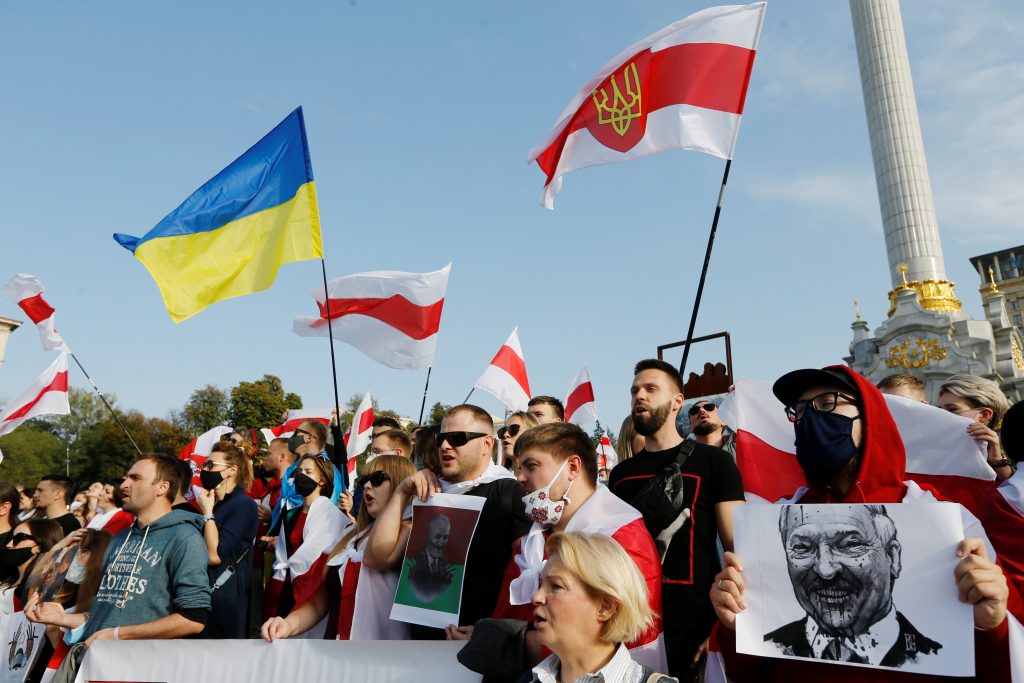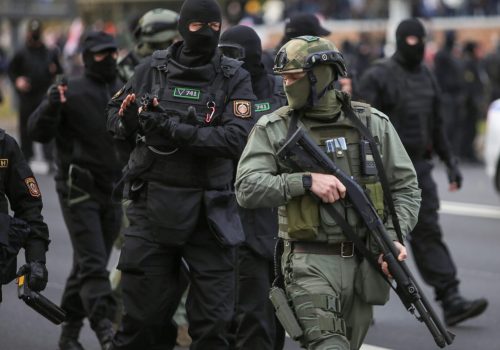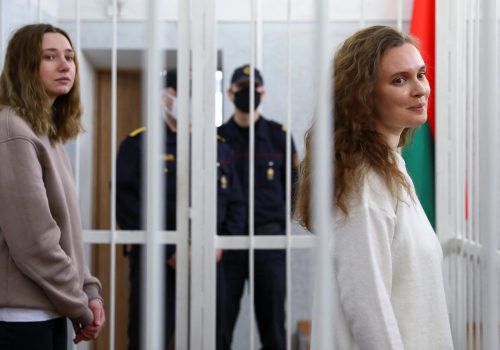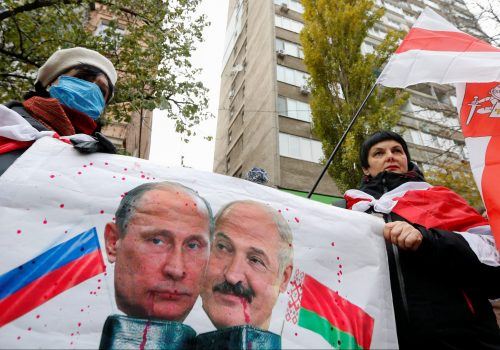The unprecedented pro-democracy protest movement that erupted in Belarus last summer has unleashed a geopolitical shock wave throughout the wider region. Since the crisis first began in August 2020, international attention has tended to focus on the challenges created for Russia and the European Union. However, the Belarusian relationship with neighboring Ukraine has also come under significant strain. In many ways, the democratic awakening in Belarus has fractured and realigned the economic, military, diplomatic, and security relationship between Minsk and Kyiv.
For years, bilateral ties between Ukraine and Belarus were shaped by the often radically different approaches adopted by the two nations towards managing their respective relationships with Moscow. Given the Kremlin’s ambitions to maintain its dominant position within the post-Soviet region, the Russian factor has weighed heavily in both Minsk and Kyiv. The need to manage ties with Russia has in many ways defined Ukrainian-Belarusian engagement, creating an often antagonistic but mutually dependent relationship that continues to oscillate wildly.
Belarusian strongman Alyaksandr Lukashenka has recently returned home from his latest summit meeting in Sochi, during which he pleaded for additional assistance from Russian President Vladimir Putin. The visit in turn sparked the latest round of speculation over Lukashenka’s readiness to accept Russian demands for deeper integration. As the Western world grows ever more distant with every act of repression from his security services, the Belarus dictator appears to have little option but to accept greater Russian dominance in return for desperately needed support.
Meanwhile, diplomatic relations between Belarus and Ukraine remain significantly strained. This deterioration began in the early days of the crisis last summer. In line with broader international opinion, Ukraine declined to recognize the official results of the flawed August 2020 Belarusian presidential election. This sparked an indignant response from Lukashenka, who accused Kyiv of having sided with the West against him.
As the crisis escalated, Lukashenka repeatedly claimed Ukraine was part of an insidious plot against him masterminded by NATO, the Poles, the Lithuanians, and the Western world in general. Bilateral relations deteriorated rapidly as a consequence, with the Ukrainian Ambassador to Belarus subjected to the seemingly calculated diplomatic indignity of a border crossing search in early September.
Tensions with Ukraine continued to simmer throughout the final months of 2020. The Lukashenka regime was furious over Kyiv’s moral support for the Belarusian pro-democracy movement and the Ukrainian government’s apparent readiness to help Belarusian dissidents. Many suspected that Lukashenka’s vocal criticism of Ukraine was also designed to win favor in Moscow.
There was considerable additional anger within the Lukashenka regime at Ukraine’s decision to extend a red carpet welcome to Belarusian tech companies and IT professionals looking to relocate from Minsk. Ukrainian efforts to benefit from Belarus’s growing IT industry exodus drew sharp criticism from Belarusian officials as an unfriendly act. However, the breakdown in bilateral ties remained far from complete, with Ukraine continuing to discreetly purchase electricity from Belarus.
There were indications that the war of words between the Ukrainian and Belarusian foreign ministries was beginning to cool off by the end of year. Some Belarusian analysts have since hinted that Minsk may not have been taking the confrontation very seriously, despite the strong language employed.
“Relations still exist but it would perhaps be better if both foreign ministries took a very deep breath and a long pause,” says Denis Bukonkin, Director of the Foreign Policy and Security Research Center. “From the Belarus perspective, it looks as if the Ukrainian Ministry of Foreign Affairs is leaning toward EU policy and is obliged to take the same positions as the EU. The Belarusian Foreign Ministry sees any Ukrainian statements as being primarily geared toward their EU allies and therefore does not take these statements personally.” According to Bukonkin, the current diplomatic chill between Kyiv and Minsk is unlikely to give way to a thaw any time soon unless EU-Belarus ties also improve.
While Kyiv has more or less openly backed the Belarusian pro-democracy protest movement, the leadership of the Belarusian opposition has not entirely returned the favor. With a view to keeping a window open for future conversations with Moscow, Belarusian opposition leader Sviatlana Tsikhanouskaya has been cautious about adopting pro-Ukrainian positions on key geopolitical issues such as the 2014 Russian seizure of Ukraine’s Crimean peninsula.
“The Belarusian opposition has maintained its distance from Kyiv. There are officially no issues between Ukraine and Belarus but in reality, relations are frozen,” explains Andrei Kazakevich, Director of Political Studies at the Political Sphere think tank. “Tsikhanouskaya’s refusal to make a clear statement on the question of Crimea has kept the Ukrainians from further developing relations with the Belarusian opposition leadership in exile. Other opposition leaders such as Pavel Latushka are also in no rush to make such pronouncements [on Crimea] in order not to foreclose the possibility of further contacts with Moscow.”
The rise in bilateral tensions between Kyiv and Minsk over the past seven months follows on from a period of intensified engagement dating back to the onset of Russian aggression against Ukraine in early 2014. The outbreak of hostilities between Russia and Ukraine placed Belarus is an extremely delicate position and tested Lukashenka’s diplomatic skills to the maximum.
Since 2014, the Belarus strongman had sought to play both sides off against one another, while at the same time resolutely taking the Russian side during important votes in international bodies. Belarus was one of only 11 nations to vote against Ukrainian territorial integrity at the United Nations on March 27, 2014, following the Russian invasion and occupation of Crimea. Minsk would also go on to take Moscow’s side during subsequent United Nations votes pertaining to territorial integrity issues as well as human rights abuses committed against the Crimean Tatars.
Despite this support for Moscow on the global stage, the Belarusian strongman has sought to occupy the middle ground whenever possible. Lukashenka’s geopolitical balancing act has involved making himself useful to everyone in the region. Crucially, he has offered Ukraine iron clad guarantees of neutrality and pledged to prevent Russian troops or proxies from posing a threat to Ukraine’s northern borders from Belarusian territory.
These security assurances are hugely significant for the military balance in the region. Ukraine and Belarus share a border of over 1,000km. Any Russian military pressure from the north would totally redefine the current conflict and would force Ukraine to radically rethink the country’s entire defense posture. In this context, Lukashenka’s repeated jokes about arriving at the Ukrainian border on a tractor rather than a tank have been part of his efforts to calm nerves in Kyiv.
Faced by the overwhelming might of Russia, Belarus and Ukraine have had good reason to develop security cooperation in recent years. Prior to the current crisis in Belarus, Kyiv and Minsk regularly exchanged intelligence reports and other sensitive information. It was by all accounts a relationship that Kyiv valued. I have been informed that much of the intelligence shared by the Belarusian intelligence services with their Ukrainian colleagues was deemed to be exceedingly useful.
Eurasia Center events

Beginning in September 2014, a key aspect of Belarus-Ukraine ties has been the role of Minsk as the location for peace negotiations between Moscow and Kyiv. This status had allowed Lukashenka to considerably bolster his international reputation as a reliable partner and gracious host for the leaders of the Normandy Format countries (France, Germany, Russia, and Ukraine).
Until the outbreak of pro-democracy protests in Belarus last summer, this role as host of the Russo-Ukrainian peace negotiations had been seen as important enough to regional defense arrangements for European and American leaders to increasingly put aside their qualms about dealing with Lukashenka.
However, the new geopolitical realities created by Lukashenka’s brutal crackdown on pro-democracy demonstrations have served to undo any advantages accrued as a result of the Minsk peace process. With Lukashenka isolated from the West and reliant on Russia, the entire future of the Minsk negotiation format has been thrown into question. It is now obvious that the Ukrainian delegation no longer regards Minsk as a neutral venue, while human rights concerns also make Lukashenka an entirely unsuitable host from a European point of view.
These issues have arisen at a time when the situation in Russian-occupied eastern Ukraine is once again entering into a period of escalation. There has been an uptick in Ukrainian military casualties during the first months of 2021 as Moscow has responded aggressively to President Zelenskyy’s moves against Russian proxy political forces and television stations inside Ukraine.
In the current circumstances, it is difficult to imagine the Ukrainian side agreeing to continue with the Minsk negotiation format. Meanwhile, it is equally hard to envisage Russia agreeing to any fundamental changes.
“The situation with Minsk remaining the negotiating platform for further contacts between Kyiv and Moscow has not been fully resolved, even though it is obvious that the Belarusian capital can no longer serve as the location for neutral talks under these circumstances,” says Yauheni Priherman, Director at the Minsk Dialogue on International Relations. “I am not entirely sure that this is a settled matter as Ukraine is insisting on changing the location of future negotiations, but the Europeans have no idea what to do about the issue. It does not look like any decision will be made anytime soon.”
With Lukashenka more and more dependent on Russia, Moscow continues to explore opportunities to increase military pressure on Ukraine and the European Union via Belarus. Lukashenka has long resisted Russian efforts to establish permanent military bases on Belarusian territory, but the Kremlin already manages two strategic facilities in Belarus. One is a long range submarine communications hub, while the other is an anti-rocket radar facility.
Talks are currently underway to extend the treaties governing these Russian facilities, with most observers expecting Moscow to retain its current presence in Belarus. The real issue is whether the Kremlin will prove able to acquire a further military foothold. Putin has long set his sights on a Russian air base in Belarus, which Lukashenka has always seen as unacceptable. However, this may be part of the terms and conditions for continued Russian backing. For obvious reasons, any increase in the Russian military presence in Belarus would be viewed with extreme alarm by Ukraine.
The military component is just one aspect of the complex relationship between Kyiv and Minsk. Ukraine’s desire to pursue Euro-Atlantic integration and Belarus’s focus on closer ties with Moscow have placed the two countries on sharply diverging geopolitical trajectories, but a shared desire to manage Russian imperial ambitions has also created considerable common ground.
The unexpected and unprecedented pro-democracy uprising of the past seven months in Belarus has served to further complicate bilateral ties and fueled increasingly public tensions in what has traditionally been a diplomatically courteous and outwardly friendly relationship. This has caused significant damage, but ties between the two countries are surely not beyond repair.
With hopes fading for a rapid conclusion to the pro-democracy uprising in Belarus, both Kyiv and Minsk now appear to be looking to dial down the diplomatic belligerence of late 2020 and settle into a new period of comparative calm.
Tellingly, Lukashenka has recently ceased including Ukrainians in the paranoid pantheon of his imagined enemies. The Belarusian dictator is nothing if not politically cunning. During his 26-year reign, he has learned to avoid turning opponents into mortal enemies. He may now be seeking to adopt a similarly pragmatic approach towards future relations with Ukraine.
Vladislav Davidzon is a Nonresident Fellow at the Atlantic Council’s Eurasia Center.
Further reading
The views expressed in UkraineAlert are solely those of the authors and do not necessarily reflect the views of the Atlantic Council, its staff, or its supporters.

The Eurasia Center’s mission is to enhance transatlantic cooperation in promoting stability, democratic values and prosperity in Eurasia, from Eastern Europe and Turkey in the West to the Caucasus, Russia and Central Asia in the East.
Follow us on social media
and support our work
Image: Demonstrators on Kyiv's Independence Square stage a rally in solidarity with the Belarusian pro-democracy opposition. (REUTERS/Valentyn Ogirenko)




